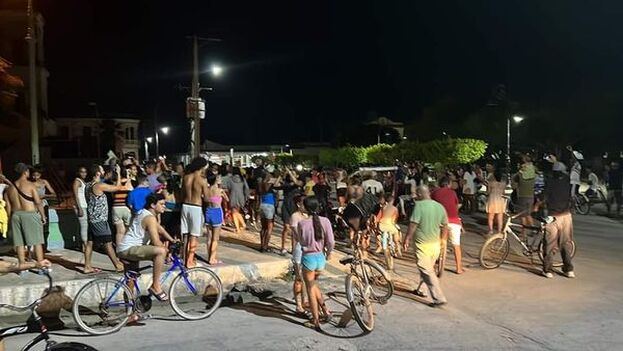
![]() 14ymedio, Yunior García Aguilera, Madrid, 12 October 2022 — On August 23, 1973, in the Swedish city of Stockholm, Jan-Erik Olsson attempted to rob a bank. His four hostages, despite the violence and threats to their lives, ended up protecting their captor and demonstrating vehement empathy toward him. Upon seeing this strange reaction of the victims, psychiatrist Nils Bejerot coined the term “Stockholm syndrome.”
14ymedio, Yunior García Aguilera, Madrid, 12 October 2022 — On August 23, 1973, in the Swedish city of Stockholm, Jan-Erik Olsson attempted to rob a bank. His four hostages, despite the violence and threats to their lives, ended up protecting their captor and demonstrating vehement empathy toward him. Upon seeing this strange reaction of the victims, psychiatrist Nils Bejerot coined the term “Stockholm syndrome.”
The letter signed by a group of artists and intellectuals, denying the repression and praising the administration of the worst government Cuba has experienced in all its history, seems written by the hostages of that bank. The signatories not only displayed a cynical attitude, but rather, a sick one.
How can they deny the repression in a country where the little dictator gave the combat order on national television? How can they close their eyes to what occurred on our streets, to the hordes armed with clubs exiting the trucks to beat protesters? How can they pretend that in Cuba there aren’t more than a thousand young people in jail for yelling that they have had enough of the darkness and misery? Don’t those who subscribed to that letter realize that their signature is as culpable as the blow of a henchman, or the bullet that entered Diubis Laurencio’s back?
It is not the first time something like this happens. In 2003, a group of well-recognized Cuban intellectuals signed a the Mensaje para los amigos que están lejos [A message to our friends who are far away], supporting the imprisonment of 75 dissidents and the execution of three young men. If that was called the Black Spring, this has been the Black Autumn, as somber as the blackouts, as dark as the present and future of an entire country. Some of those who placed their signature there have, with time, regretted it and have refused to make the same mistake. But others repeat it. And new names are added to the infamy.
I saw the signatures of certain people who I considered “my friends”. But in signing that letter they are backing all the terror my family suffered. It is as if they themselves were the ones who threw me onto the garbage truck on July 11th, the same ones who decapitated doves at my door, and threatened to put me in jail for 27 years, and surrounded my house on November 14th, the same ones who launched me into exile. They are not my friends. They are the courtiers of a despotic regime, the accomplices of those who hold on to power by force and have Cuba buried in disgrace.
I don’t know what they gain by “acting like Swedes.” I don’t know if, for them, it is worth smearing their names with mud forever to keep their positions, publish a little book, come out with an album or gain some sad privilege. By signing “the Stockholm Letter” they’ve reached the limit of subservience.
There were always people like this in Cuba, willing to applaud the horror. Today, almost no one dares to admit they supported the parameterization or that they were the architects of the Five Grey Years. But none of those horrible chapters would have happened without counting on the acolytes, slime balls, and applauders. Each sinister phase of history has its side kicks, fixers, co-authors. And the signers of that letter have made a pact with the mafia that gets fat at our expense.
Returning to Stockholm syndrome, there is an important detail that deserves attention. One year after the bank robbery which gave rise to that psychological reaction, another important event occurred. Patricia Hearst, the granddaughter of a magnate, was kidnapped in California by the Symbionese Liberation Army. Shortly thereafter, the victim herself joined the kidnappers and helped them rob a bank. Patricia, who had been sexually abused by her captors, changed her name to Tania, just like the guerrilla fighter who accompanied Che Guevara. The cameras at the bank recorded her holding a rifle and actively participating in the robbery. Although her lawyers tried to defend her, alleging she suffered from the syndrome, the jury convicted her anyway.
Don’t believe, signers of the infamous letter, that history will absolve you. Lately, you have experienced a massive rejection by most Cubans. And abroad, those hypocritical letters no longer have much of an effect. The world has already seen the repression in Cuba. And the world has seen you buckle, as shameless opportunists, under a perishing dictatorship.
Translated by: Silvia Suárez
____________
COLLABORATE WITH OUR WORK: The 14ymedio team is committed to practicing serious journalism that reflects Cuba’s reality in all its depth. Thank you for joining us on this long journey. We invite you to continue supporting us by becoming a member of 14ymedio now. Together we can continue transforming journalism in Cuba.
